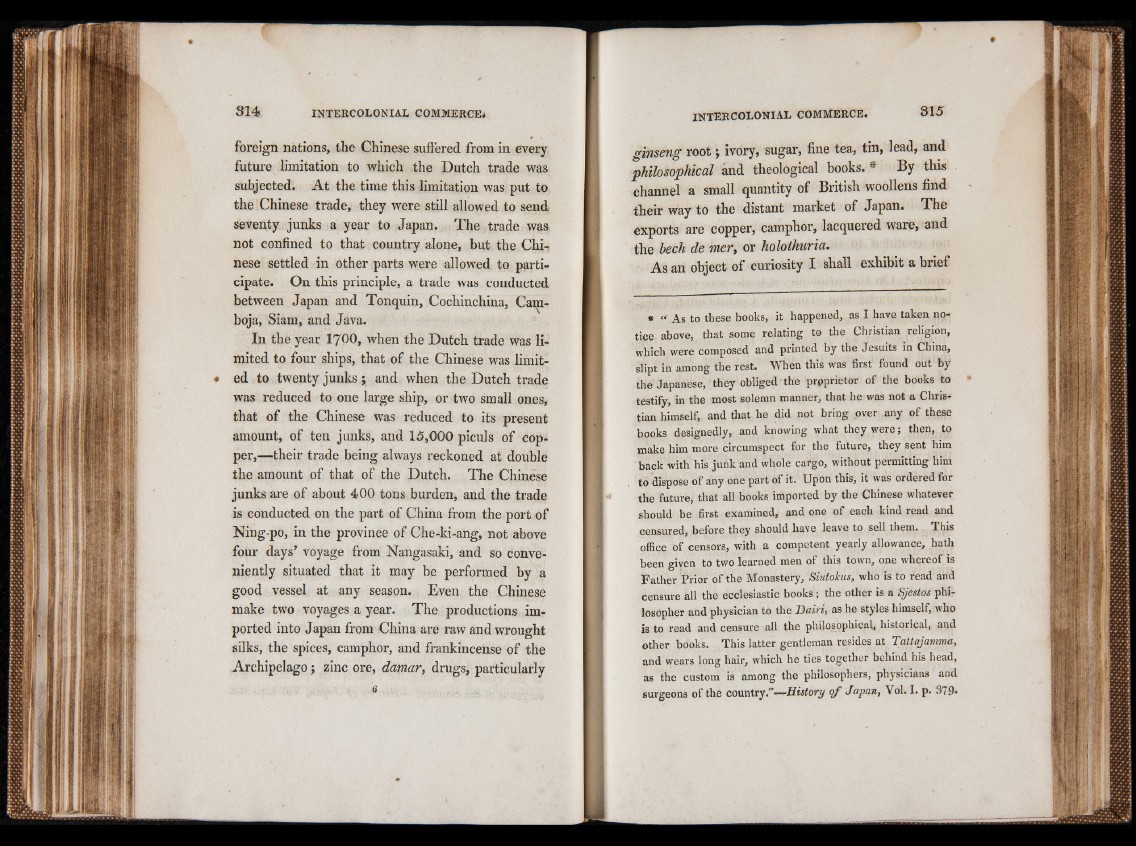
foreign nations, the Chinese suffered from in every
future limitation to which the Dutch trade was
subjected. At the time this limitation was put to
the Chinese trade, they were still allowed to send
seventy junks a year to Japan. The trade was
not confined to that country alone, but the Chinese
settled in other parts were allowed to participate.
On this principle, a trade was conducted
between Japan and Tonquin, Cochinchina, Cam-
boja, Siam, and Java.
In the year 1700, when the Dutch trade was limited
to four ships, that of the Chinese was limited
to twenty junks ; and when the Dutch trade
was reduced to one large ship, or two small ones,
that of the Chinese was reduced to its present
amount, of ten junks, and 15,000 piculs of copper,—
their trade being always reckoned at double
the amount of that of the Dutch. The Chinese
junks are of about 400 tons burden, and the trade
is conducted on the part of China from the port of
Ning-po, in the province of Che-ki-ang, not above
four days’ voyage from Nangasaki, and so conveniently
situated that it may be performed by a
good vessel at any season. Even the Chinese
make two voyages a year. The productions imported
into Japan from China are raw and wrought
silks, the spices, camphor, and frankincense of the
Archipelago; zinc ore, damar, drugs, particularly
ginseng root; ivory, sugar, fine tea, tin, lead, and
philosophical and theological books. * By this
channel a small quantity of British woollens find
their way to the distant market of Japan. The
exports are copper, camphor, lacquered ware, and
the bech de mer, or holothuria.
As an object of curiosity I shall exhibit a brief
* “ As to these books, it happened, as I have taken notice
above, that some relating to the Christian religion,
which were composed and printed by the Jesuits in China,
slipt in among the rest. When this was first found out by
the Japanese, they obliged the prpprietor of the books to
testify, in the most solemn manner, that he was not a Christian
himself, and that he did not bring over any of these
books designedly, and knowing what they were; then, to
make him more circumspect for the future, they sent him
back with his junk and whole cargo, without permitting him
to dispose of any one part of it. Upon this, it was ordered for
the future, that all books imported by the Chinese whatever
should be first examined, and one of each kind read and
censured, before they should have leave to sell them. This
office of censors, with a competent yearly allowance, hath
been given to two learned men of this town, one whereof is
Father Prior of the Monastery, Siutolcus, who is to read and
censure all the ecclesiastic books; the other is a Sjestos philosopher
and physician to the Bairi, as he styles himself, who
is to read and censure all the philosophical, historical, and
other books. This latter gentleman resides at TattajamTna,
and wears long hair, which he ties together behind his head,
as the custom is among the philosophers, physicians and
surgeons of the country.”—History q f Japan, Vol. I. p. 379*